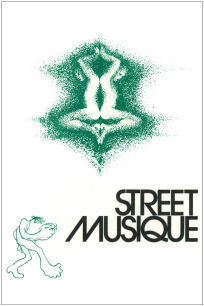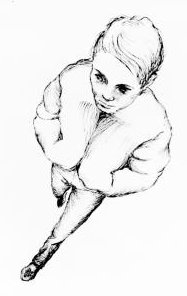| Street Musique | |
|---|---|
 DVD cover for the film | |
| Directed by | Ryan Larkin |
| Produced by | Ryan Larkin |
| Music by | Rick Scott Dick Tarnoff Rick Stone Rick Watson Jim Colby Jon Van Arsdell |
Production company | |
Release date |
|
Running time | 9 minutes |
| Country | Canada |
| Budget | $45,734 [1] |
Street Musique is a 1972 animated short film by Ryan Larkin produced by the National Film Board of Canada (NFB). It is a line animation of "music as performance", [1] in which actions of the film's characters are choreographed to the music of street musicians. [2]
Contents
Soon after returning from the 42nd Academy Awards in 1970, for which his animated short film Walking had been nominated, Larkin was loaned by the NFB to a Vancouver art school, where he stayed for eight months conducting animation workshops. [3] He would travel to each student's studio to direct them, one of which was a group of street musicians. [3] These street musicians were the origin of the idea for the film, as Larkin had stated that "they would make a great focal point for my abstract images". [3]

The film consists of five or six vaguely defined segments whose animation matches the pace of the music to which it is set. [3] It begins with a photograph of a musician that is replaced by a line drawing of that photograph. [4] A transition leads to images of a man's body transforming into abstract improvisational forms using line shading and watercolours. [5] [6] The figures undergo a continuous metamorphosis throughout the film. [3] Chris Robinson stated that the film's awkward ending is indicative of Larkin's creative hesitancy, as the last image is a figure waiting for music. [3] Larkin said that he "ran out of ideas" and "didn't know how to end the film". [3]
The film cost $45,734 (equivalent to $304,441in 2023) to make. [1]
Street Musique won the Grand Prize at the Melbourne International Film Festival in 1973, which included a cash prize of A$ 2,500 from the Government of Victoria in Australia. [7] The film also received the Jury's First Prize at the Berlin Film Festival of Animated Films. [8] [9] Larkin was fond of the Melbourne International Film Festival award because Street Musique "was a ten minute film up against all kinds of complicated feature films". [3] He used the prize money to support young artists in Montreal, to whom he rented his nine-room apartment for CA$ 100. [10]
In 2000, after having lived on the streets in Montreal and spending his nights at the Old Brewery Mission, Larkin met Chris Robinson. [11] [12] During a discussion, Larkin told Robinson that after creating Street Musique, he was bereft of ideas for new projects. [13] Robinson invited Larkin to be a member of the selection committee for the Ottawa International Animation Festival. [14] The other three members were Chris Landreth, Pjotr Sapegin, and Andrei Svislotksi, [15] none of whom were aware of Larkin's identity. [16] After reviewing selections, they screened each other's films. [17] Larkin was last, showing Walking, Street Musique, and Syrinx. [17] Landreth was immediately inspired to create a documentary film about Larkin's life, which became Ryan . [18] The animated documentary incorporated in their entirety Street Musique and Walking. [19] Larkin's character in Ryan is animated to dance with characters from Street Musique. [20]










